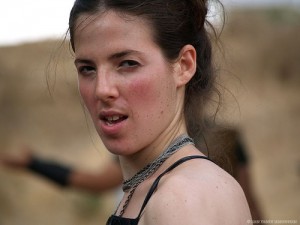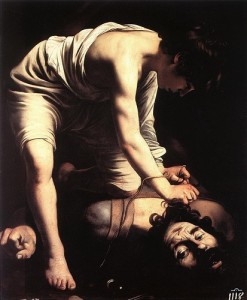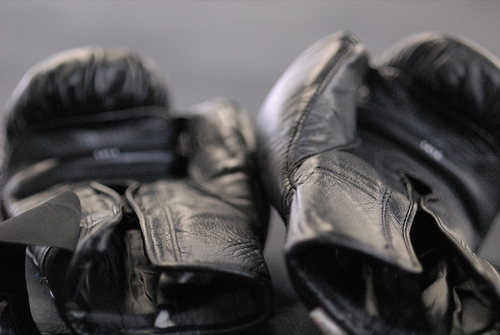This morning at 2 am, I rose. My neck was sore and my chest was tight. There is a weariness that comes from living this life and bearing so many crosses, and our age overpowers us. And yet the fog was clearing, and the time was near. I heard the bugle sound, which signaled not the respite of taps but the call for war, and I knew. I knew it was time, and I stumbled onto the field next to warriors also fractured and spent. We nodded in mutual assent, and I lifted up my arms to clasp the handle of the sword, resting in the sheath strapped with buckles to my back. I heard the metal sing against the leather as my triceps pulled it free, its weight as much as my child with a core of steel. I am not a man and do not have the strength of an ox, so I hold it with shaking arms. I look to my left and slowly to my right and see the warm comforting breath of others, weapons raised, ready. There is war paint on some, other cheeks streaked with tears. All are waiting the call from our commander to invade, for the time is now and sleeping is done.
And all of a sudden I charge, not with a whisper or a bowed head. I do not glance at the ceiling or stare aimlessly forward, but with sweat dripping from my forehead I look toward the face of God and let out a cry so piercing and deep that I surprise myself. I stab and cut apart and I do not let one man survive. Because evil is not to just be fought valiantly, but it is to be won. It’s hard when evil lies beside you, or is in the heart of your own clan, and worse when in your own flesh, but you cut it out and eliminate its tendrils from racing toward your soul. Sometimes the soldiers I slay disappear on the field, fading into the rising fog, which makes it hard to see the living from the dead.
There are times I want to charge this hill and God says another, telling me that the plan is more intricate than I realize and that we are fighting a long, bloody war. And there are times I lose a battle, wrestling hard for what I think is best, but it is not to be. There is a longer road ahead, soldiers whisper at night as we regain our strength. And I don’t understand those moments, the mystery of why. I look around and it seems like I’m fighting all alone. My sword grows to heavy to bear, my eyes are sore, and my ankles bow from running on rocks and gravel.
So I slow, and bend to put my hands on my knees. I just need a breather. I am so tired of courage. And yet I soak oxygen into lungs and stand tall again, ready for another bugle call. I’ve learned through the many years that death really isn’t the great fear: living with a chasm established between self and God is the real terror. Prayer is a tool to root out our inner demons, and commune with God in a way only soldiers can relate. I listen and obey, whatever way He orders. Sometimes my prayers aren’t answered and I don’t know why, and other times they are answered in abundance. But I charge the hill in front of me, because that’s the battle plan.
I don’t see Jesus as meek or mild, just a man who spoke gently with crows feet and soft, pretty eyes. A lion is not less fierce because he’s lying in the noonday sun yawning and licking his paws. A man who faced persecution he did not deserve, resisted the urge to prove his earthly status, had the power to move mountains, repelled the devil face-to-face, and hung on nails for what he did not do – this is power of a kind that I can only serve. This is leadership for which I can only follow. This is a commander for whom I lay down my very life, and fight when called. There’s no way around the pain. You can’t run around it or sidestep it or numb it. You have to run right through it with swords raised.
This is prayer. It is bold. It is strong. My fellow warriors, we have no other option but to slay evil, fight for good, and win this long war.
I’m not a big fan of “I’ll be praying for you.” Mostly because I don’t believe it when people casually throw it around, and I feel it’s somehow watering down the practice by sprinkling it into most all conversations, just squeezing it between let’s go to lunch and I love your boots. And I don’t think we should all be out there praying to find the perfect red dress at Macy’s because it’s our lunch hour and we need this thing to happen.
But I wholeheartedly believe in the power of prayer. I dated a Catholic once. He went to confession because that’s what a good Catholic does, like brushing one’s teeth or unloading the dishwasher. And then there are the dinnertime prayers, sometimes out of obligation or guilt or habit or routine, thanking God for enchiladas and buttered corn. I had a talk with a girlfriend recently who said she didn’t believe God really answered prayers of substance. Now she mostly just asks for wisdom without getting too specific.
I don’t have a field guide for prayer. And in some way I think God hears them all, buttered corn and red dresses alike, chuckling at times and forgiving our immaturity. But “when I was a child, I talked like a child. I thought like a child. I reasoned like a child. When I became a man, I put the ways of childhood behind me.” 1 Corinthians 13:11.
I grew up somewhere between school girl and mother. And when I pray, I take it seriously. I yell and cry out and beg and plead very specific things, sometimes muttering the only words that come to mind. Other times I just sit and repeat the name of Jesus like a balm to my battle wounds. I might raise a name of a friend, or a situation that’s unresolved, and other times I write it all down and just save it in anger, like God can darn well read it for himself. I don’t think there’s a right way to pray. But don’t deceive yourself that it’s just empty words floating toward the night sky. Prayer is power, and answers will come. My brothers, it’s the lion sleeping in the night. When it charges forth with teeth baring, it slays.
See you on the battlefield.
photo:
(three w’s)thenflickr.com/photos/ranh/270486400/sizes/m/in/photolist-pUjbC-pUjeF-pUj6j-cMzAJ1-3aJfRU-5jYhFi-vYHvP-apPf2R-6Bz3A7-4pNsMx-8S5W1d-5p6SKH-bRWztz-bD2Rvj-bUp84p-bUzjiG-bUzjnL-bUzjzs-bUziSb-bUzjvb-bUziBo-bUziL9-bUzitU-bUziVQ-bUzjCN-bUzj1u-bUzj8E-4MxcfG-bUzjHo-bUzjQ3-bUzjdN-e8xyDM-9h3LW8-93GFFe-7GYTuP-97qsCn-97qq9D-46Bmup-4iJR6Q-7FaSJz-47xnaK-pUj2t-bumETh-pUk7M-pUk4U-pUjXT-pUkaf-pUkcT-bmKeHQ-74hUTE-74dZPD/













